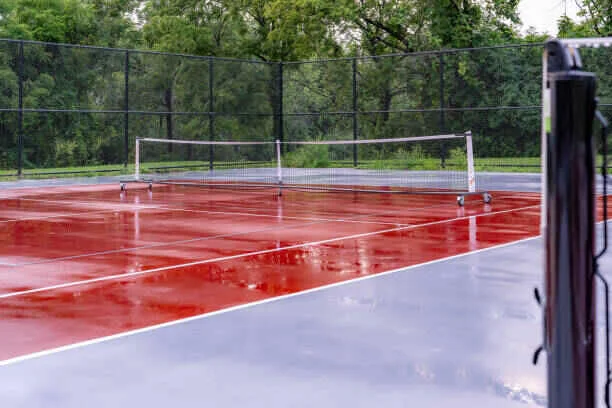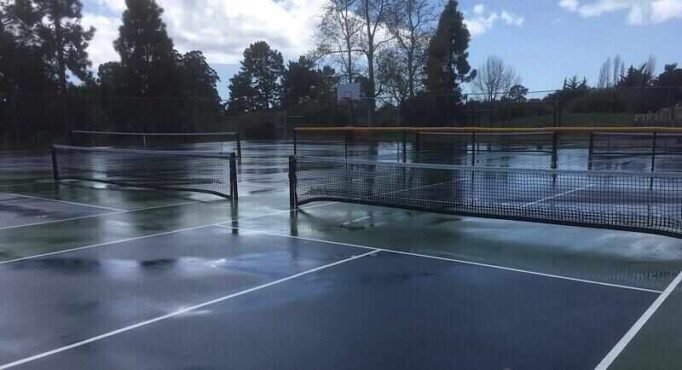
When you start playing pickleball, you’ll probably want to play with your friends or family whenever possible. Of course, you will also hope for sunny weather so that you can play to your heart’s content. But what if the weather isn’t great and the court is wet or even unusable?
Pickleball can be played in a variety of situations, but before you do, it’s important to understand the risks involved and how to manage them. And how does a wet court affect the game? Let’s discuss that later in this article.
The Risks of Playing on Wet Courts
A wet court is not safe to play on. It would be risky to insist on playing on a wet court. The slippery surface can increase the risk of injury. In addition, equipment such as paddles and shoes will be damaged more quickly because they are not being played in proper conditions.
You may also not be able to maximize your game because it is difficult to control your movements on a wet and slippery court. The bounce of the ball on the field is also not optimal, making it difficult for you to return the ball.
Assessing the Wetness
As a wise player, you can make an assessment of the type and degree of wetness on the field. You need to distinguish between light drizzle, puddles, and soggy field conditions. By doing so, you can make a better decision as to whether or not the current field condition is suitable for play. And what action should be taken to clean and dry the wet field.
Another thing you can do is assess what type of material the field is made of. Is it asphalt, concrete or synthetic? Each of these materials responds differently in wet conditions. So make sure you also check this section for your assessment before playing.
Here are some properties of different pitch materials when wet:
Asphalt
Courts with asphalt material tend to absorb less water, so the court will quickly flood with water during rainy weather. Also, wet asphalt fields are more slippery than fields made of other materials. So if you want to play on an asphalt field when it’s wet, think twice.
Concrete
The material properties of concrete are very similar to those of asphalt. Even concrete courts have a hard time absorbing water. However, concrete fields have better grip when wet than asphalt, and concrete also has a less rough surface, making it easier to drain water off the court.
Wood
Wooden courts are usually only found on indoor courts. But, even though it is an indoor court, it can still get wet from sweat or spilled water. The surface of a wooden court is so smooth that if the court is even slightly wet, the surface becomes very slippery. This is why wooden courts are only recommended for indoor courts. But don’t worry, the wooden court is easy to clean, you just have to wipe it completely dry and the game can continue.
Impact on Ball Movement

The pickleball ball is made of plastic with holes, which makes it very unsuitable for playing on a wet court. This is because it greatly affects the movement of the ball and its durability. When the field is wet or waterlogged, the bounce of the ball is not maximized and will be lower than it should be. Of course, this will make it difficult for players to react to the bounce.
The speed and rotation of the ball is very different when played on a wet field. It is certain that the speed of the pickleball ball will be greatly affected because its movement is hindered by a lot of air and water. Also, the ball cannot rotate properly because the ball gets wet as you play and the rotation of the ball cannot be controlled properly.
Alternatives to Wet Court Play
A pickleball court that is wet from rain will certainly have a higher risk of injury than a dry court. You may want to consider other alternatives, such as changing your schedule. You can arrange to postpone your game to make it safer and more enjoyable.
Also consider playing on an indoor court; when the weather is less friendly, playing on an indoor court may be the best choice to continue playing pickleball with your friends. Or you can practice your physical conditioning and ball control indoors, which is less risky.
In addition, you can do other things as a form of practice, such as watching the matches of professional players and also reviewing the results of your own pickleball matches. This will give you knowledge about the other side of pickleball and will certainly be useful in developing your pickleball skills.
Safety Tips for Wet Court Play
When you have no choice but to play on a wet field. Here are some tips to help you avoid dangerous risks while playing.
- Use the right footwear, make sure you wear shoes that provide a firm grip and do not slip easily when playing on a wet field.
- Control your movements, try to move as little as possible and do not make sudden movements, such as taking long strides or suddenly changing the direction of your foot.
- Adjust your playing style. Play safely, use regular strokes and don’t hit too many powerful shots or you could slip on your own foot. Instead, adjust your strategy and hit the right shot at the right time to steal points from your opponent.
Conclusion
Pickleball is a game best played in sunny weather on dry courts. It is possible to play on wet or waterlogged courts, but safety should be a priority rather than endangering yourself and others. Also, the game cannot be played properly on a wet court. This article provides tips and alternatives for when the weather is bad or the court is wet and flooded.
Don’t forget to leave a comment below and give us your input on the topic of discussion for the next article!

